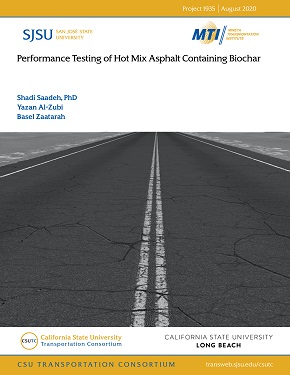- 408-924-7560
- mineta-institute@sjsu.edu
- Donate
Performance Testing of Hot Mix Asphalt Containing Biochar
In recent years, researchers have been able to identify asphalt binder additives, such as polymers and bio-binder, that can enhance the rheological and mechanical properties of asphalt binders. Earlier studies show that utilizing bio-binder as a partial replacement for asphalt binder has shown promising results in both mechanical and sustainability aspects. Biochar additions improved binder viscosity and low-temperature characteristics. Biochar, which is a byproduct of producing bio-binder, has shown enhanced rheological and mechanical properties when used as an additive to the asphalt binder. In this study, the mechanical properties of asphalt mixtures containing Biochar were investigated. In addition, its color degradation was investigated. The Semi-Circular Bending (SCB) test proved to be a suitable test method to analyze the fracture properties of asphalt mixtures. Similarly, the Hamburg Wheel Tracking (HWT) test is efficient in testing for and analyzing the rutting and moisture susceptibility of asphalt mixtures. This study used the SCB and HWT tests to investigate the mechanical properties of asphalt mixtures containing Biochar. The study incorporated conventional (virgin) and rubberized mixtures and investigated the effect of aging as well. The SCB results suggest that adding Biochar helped attain higher strain energy values for virgin and rubberized mixtures after aging. The HWT results showed that the addition of Biochar helped achieve lower rut depth for non-aged mixtures. After aging, and since Biochar reduces the effect of aging, aged Biochar mixtures achieved higher rut depth (less hardening) compared to virgin aged mixtures. As for color degradation, the addition of Biochar helped to decrease the color degradation of the asphalt mixture compared to the control mixture.
SHADI SAADEH, PhD
Dr. Shadi Saadeh joined the CSULB Civil Engineering and Construction Engineering Management Department in 2007. Dr Saadeh worked for the Texas Transportation Institute (TTI) from 2003-2005 and the Louisiana Transportation Research Center (LTRC) from 2006- 2007. He received his BSc in civil engineering from University of Jordan (1997), MSc in Civil Engineering from Washington State University (2002), and PhD in Civil Engineering from Texas A & M University (2005).
Dr. Saadeh’s research focuses on granular materials, including asphalt mixes and its constituents. His main areas of research are experimental characterization of highway materials, constitutive modeling of highway materials at the microstructural level, performance evaluation of highway infrastructure, flexible pavement design and analysis, and experimental characterization of highway materials using X-ray computed tomography (CT), image analysis techniques, and mechanical testing.
Dr. Saadeh has authored research papers in high-quality engineering and scientific journals such as Journal of Transportation Research Board (TRB), American Society for Testing and Materials (ASTM), Journal of the American Society for Civil Engineers (ASCE), Journal of the Association of Asphalt Paving Technologists (AAPT), and Journal of Computational Materials Science.
YAZAN AL-ZUBI, MS
Yazan is an estimator at Twining Inc. He has a master’s degree from California State University Long Beach. He holds a Bachelor degree in civil engineering from Yarmouk University. He has an interest in construction management, pavement design, and development.
BASEL ZAATARAH, BS
Basel is an EIT currently working as an Aviation Civil Engineer at Kimley-Horn. He has a Bachelor’s Degree in Civil Engineering from California State University, Long Beach. His interests include aviation, pavement design, and transportation geometric design.
-
Contact Us
San José State University One Washington Square, San Jose, CA 95192 Phone: 408-924-7560 Email: mineta-institute@sjsu.edu






